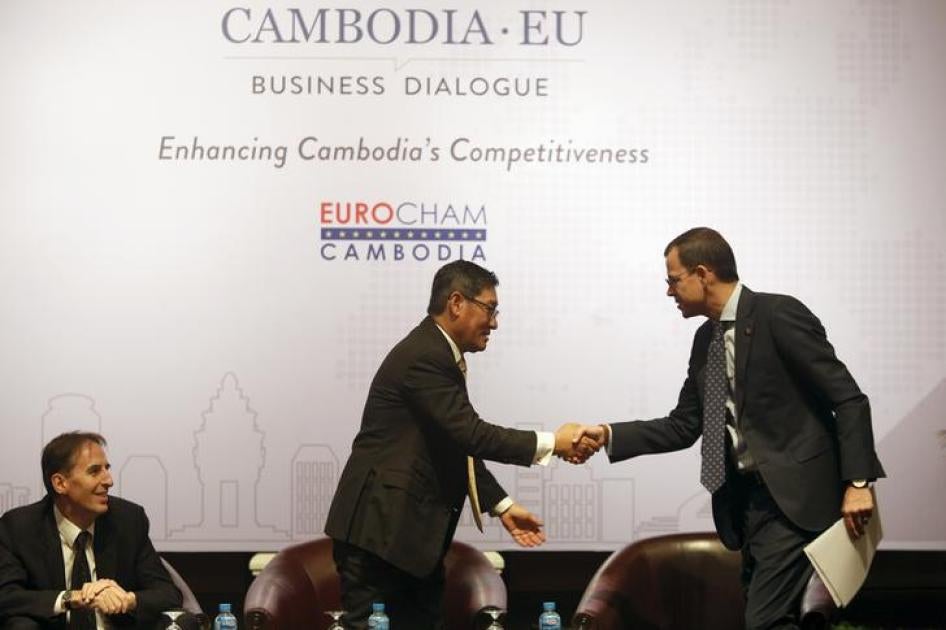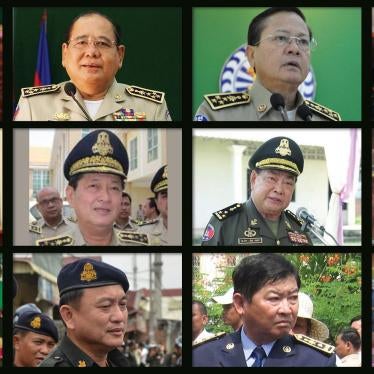A European Union monitoring mission was in Cambodia this week to assess the country’s compliance with the human rights obligations that lie at the core of the EU-Cambodia preferential trade deal.
The timing could not be more appropriate.
With national elections approaching on July 29, Cambodia is hurtling towards a one-party state under prime minister Hun Sen and the ruling Cambodian People’s Party (CPP).
Over the past year, government-controlled courts have dissolved the opposition Cambodia National Rescue Party (CNRP). The party’s leader, Kem Sokha, is in prison on spurious treason charges.
His predecessor, longtime opposition leader Sam Rainsy, has been in exile since 2015 after being convicted on trumped-up charges.
The government has effectively taken over the media, bankrupted or silenced independent newspapers, and ordered radio stations to stop broadcasting independent newscasts. Journalists have even been jailed for espionage for providing information to a foreign news organisation.
Those who stand up for victims are met with vitriol.
Last month Human Rights Watch published a 200-page report documenting serious abuses by a dozen senior Cambodian generals.
Hun Sen’s response? He angrily said he would not investigate our allegations, would also not allow NGOs or the UN to investigate his generals, and that the country’s 160,000 soldiers and police would oppose any such effort.
He denounced me personally and announced that I was banned from the country. Cambodians who make similar allegations face much worse: July 10 is the second anniversary of the assassination of Kem Ley, a wildly popular political commentator and Hun Sen critic.
EU Slow to React
The EU has been slow to react to the collapse of Cambodian democracy, but on November 16, 2017, the EU high representative Federica Mogherini issued a statement “stressing that that the enforced dissolution of the Cambodia National Rescue Party (CNRP) was a significant step away from the path of pluralism and democracy in Cambodia.”
She noted that an electoral process from which the main opposition party had been arbitrarily excluded “was not legitimate” and “disenfranchised” its supporters.
The CNRP had received 45 percent of the vote in the 2013 legislative election and 44 percent in the 2017 local election. The following month, the EU suspended its financial assistance to Cambodia’s National Election Committee (NEC).
Sadly, none of the developments in Cambodia have been surprising.
Hun Sen, who has been prime minister since 1985, is now among the world’s five longest-serving autocrats. He has personal control over almost all of the country’s institutions, including the army, police, courts, parliament and election machinery.
What Hun Sen says is effectively the law in today’s Cambodia.
The EU belatedly took steps to address this dire situation in February when the 28 foreign ministers condemned the situation in Cambodia and threatened the adoption of targeted sanctions if the situation did not improve.
Perhaps most important, it asked the commission to enhance the monitoring of Cambodia’s respect for human rights and fundamental freedoms, which underpins the granting of EU trade preferences through the Everything But Arms (EBA) scheme.
This followed a strong European Parliament resolution in December 2017 calling on the commission to temporarily withdraw trade preferences if the Cambodian government was found to have violated those obligations.
As a “Least Developed Country” (LDC), the EBA scheme gives Cambodia duty-free access to the EU for exports of all products, except arms and ammunition. But this is conditioned on compliance with a long list of international human rights standards, including civil and political rights, the Convention against Torture, and labour rights.
Substantial Leverage
If it ever chooses to use it, the EU has substantial influence and leverage over Cambodia.
The EU is Cambodia’s second biggest trading partner after the US.
In 2017 total trade between Cambodia and the EU equaled €5.86bn. But Cambodia benefits the most, with approximately €5bn in exports to the EU. Cambodia’s exports are dominated by garments, footwear and agricultural products. Cambodia even exported more than 1.42 million bicycles last year, passing Taiwan as the leading exporter to the EU.
Even some of Cambodia’s business leaders are concerned.
The Garment Manufacturers Association of Cambodia (GMAC), which represents the country’s roughly 600 garment and footwear factories, have said they are worried about the impact on the industry if the EU and US amend or remove trade preferences for Cambodia.
They are right to be worried, as a Cambodian government report in 2014 said that 80 percent of the increase in Cambodia’s exports since 2007 had been targeted to markets offering preferential access.
A large Cambodian government delegation went to Brussels last week trying to lobby the EU for a soft approach.
But no amount of diplomacy can explain away the reality of Cambodia’s horrific human rights record. Report after report by the UN and human rights groups have been sounding the alarm for years, yet Hun Sen has continued and intensified his crackdown on fundamental rights.
Cambodia is not even close to being in compliance with the EBA.
One argument raised against the EU issuing a strong report on non-compliance is that this would push Cambodia into the arms of China. But Hun Sen long ago threw his lot in with China, even favouring it over his longtime patron, Vietnam, in their dispute over the South China Sea.
The soft diplomatic approach favoured by some in the EU has proven to be a waste of time.
The EU should fully recognise this and use the means at its disposal to raise the cost for Hun Sen’s ruthless crackdown on human rights and the dismantling of the rule of law and democratic institutions in Cambodia.
The European Commission should publicly report on the EBA mission’s findings and be clear that unless the government ends its ban on the opposition, lifts restrictions on the media, releases the country’s dozens of political prisoners, and schedules genuinely free and fair elections (it’s too late for the July elections), it will have no choice but to suspend EBA and impose targeted punitive sanctions like it has done in Venezuela against those individuals responsible for the abuses.









